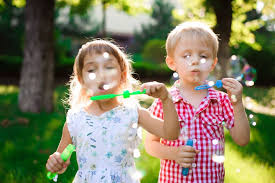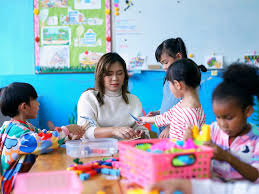In the realm of early childhood, the act of play is far more than a mere pastime. It is a cornerstone upon which a child’s entire educational journey is built. As a proficient SEO writer, I am here to elucidate the pivotal role that play assumes in early learning. Let us embark on a journey that underscores the significance of the role play has in shaping the holistic development of young minds.
Play as a Fundamental Aspect of Early Learning
Play, in all its delightful forms, serves as a vehicle through which young children learn and grow. It is the channel through which they explore, experiment, and interact with the world around them. In essence, the children’s play itself is the child’s work, and through it, they acquire not only knowledge but also a multitude of skills.
Types of Play in Early Childhood
Physical Play
Physical play is the exuberant activity of children running, jumping, climbing, and playing sports. It is not just about keeping kids active; it is about honing their coordination, agility, and strength. This type of active play also lays the foundation for a healthy and active lifestyle.
Pretend Play
Pretend play, or imaginative play, is where the magic of child creativity unfolds. Children, with boundless imagination, assume roles like doctors, teachers, or superheroes. In this make-believe world, they foster creativity, problem-solving, and storytelling skills, all while having heaps of fun.
Constructive Play
Constructive play involves the act of building, whether with blocks, Legos, or other materials. This activity not only ignites the imagination but also promotes problem-solving, spatial awareness, and fine motor skills. It is where young architects and engineers are born.
Cognitive Development Through Play
Play is not just fun and games; it is a masterclass in cognitive development. Engaging in games, puzzles, and other play activities, children acquire problem-solving skills, pattern recognition, and critical thinking abilities. These skills are the bedrock of their academic and practical life.
Social and Emotional Benefits
The playground, be it at home or in a social setting, serves as a training ground for social skills and emotional intelligence. Children learn to share, cooperate on play ideas, and negotiate with peers. They also become adept at understanding and expressing their emotions, nurturing empathetic beings.
The Role of Play in Developing Motor Skills
From those initial crawls to confident walks, and from scribbling to writing their first words, play plays an essential role in the development of gross motor skills alone. Fine motor skills, which are indispensable for tasks like holding a pencil, tying shoelaces, or using cutlery, are honed through play.
Play and Language Development
Language development gets a significant boost from play. Whether children are having a conversation with their dolls or communicating with friends, they are continually learning new words, sentence structures, and communication skills. Play is, in essence, a language laboratory.
Encouraging Play in Early Learning
Parents and educators hold the key to fostering play. They need to provide an environment that is safe and conducive to exploration and play. Age-appropriate toys, opportunities for outdoor activities, and a balance between structured and unstructured play are essential components.
Challenges in Promoting Play
In the modern world, children face a slew of challenges that impede their playtime. Academic pressures, excessive screen time, and the scarcity of safe outdoor play spaces are obstacles that demand attention. Finding ways to overcome these challenges is crucial for a child’s development.
Screen Time vs. Playtime
The ubiquitous presence of screens in children’s lives has raised concerns. While educational screen time can have its merits, it should not replace the physical and imaginative play that children need for holistic growth. Balancing screen time with playtime is the key to maintaining a healthy equilibrium.
Balancing Structured Learning with Play
Structured learning is undoubtedly important, but it should not overshadow the importance of play. Striking the right balance between structured educational activities and free play is crucial for a well-rounded education.
Play-Based Learning Approaches
Educational institutions are increasingly adopting play-based learning approaches. These approaches harmonize structured learning with the benefits of play. Research has shown that such methods can be highly effective in early childhood education.
Play in Different Educational Settings
Play is not confined to the home; it extends to various educational settings, including preschools and kindergartens. In these environments, is play important that children engage in play-based activities that align with their developmental needs, providing a supportive educational experience.
Play’s Influence on School Readiness
Early exposure to play has a profound impact on a whole child’s emotional development and readiness for formal education. Children who have experienced various forms of play tend to adapt better to classroom environments and demonstrate a higher level of readiness for academic pursuits.
Children Play: The Gateway to Learning and Development
Play is the universal language of childhood, a magical realm where young minds discover, explore ideas, and grow. In the context of early childhood, play is not merely a recreational activity; it is the essence of learning.
The Essence of Social Skills
Social skills encompass a wide array of abilities and behaviours that allow individuals to navigate social situations with confidence, empathy, and grace. These skills form the foundation of positive interactions, both in childhood and beyond.
The Early Years: Building Blocks of Social Skills
In the earliest stages of life, children begin to absorb the basics of social interaction. As they observe their caregivers and how other children engage with their peers, they learn the fundamentals of communication, cooperation, and empathy. These early lessons lay the groundwork for more complex social skills to develop.
School and Social Skills
Educational institutions also play a significant role in shaping social skills. Schools provide opportunities for children to interact with peers, learn cooperation, and engage in group projects, all of which contribute to their social growth.
Fostering Growth: How Children Develop and Flourish
Children are nature’s most remarkable works in progress. From the moment they take their first breath, they embark on a journey of development, growth, and discovery.
Younger Children
the early years of a child’s life are a period of immense potential. Nurturing all their senses, growth and development during this time is a gift that will continue to benefit them throughout their lives. It’s through love, play, education, and a supportive environment that we unlock their true potential.
The Power of Early Childhood Development
Early childhood development encompasses the physical, cognitive, social, and emotional growth that occurs in the first few years of life. It’s a period of brain development where the brain’s architecture is being sculpted, setting the stage for a child’s future learning and well-being.
Infancy: The Age of Exploration
The journey begins at infancy, where babies go through astonishing growth. They learn to roll over, sit up, crawl, and eventually take their first steps. These early milestones are the building blocks of motor skills and physical and emotional development.
Toddlerhood: Curiosity Unleashed
As children transition to toddlerhood, typically between one and three years old, their curiosity knows no bounds. Their vocabulary expands, and they learn to express themselves. This is the age of exploration, where play and imagination are the vehicles for learning.
Preschool Years: The Foundation of Learning
Preschool years, spanning from three to five years old, are the foundation of cognitive and social development older children. Children begin to understand the world around them more deeply. Their interactions become more sophisticated, and they start to form the base for future learning.
Building Blocks of a Healthy Future: The Significance of Physical Health in Children
Physical and mental health is the cornerstone of a child’s overall well-being and lays the foundation for a vibrant and fulfilling life. It’s a journey of growth, vitality, and resilience, where children learn to embrace the importance of an active lifestyle and healthy habits.
In conclusion, the importance of play in early learning is immeasurable. It is through play that children develop vital skills and knowledge, both for their academic and social lives. Parents, caregivers, and educators must actively promote play and create an environment that nurtures its growth.
Frequently Asked Questions
1. How much playtime should a child have each day?
Children should have at least one hour of unstructured playtime daily, in addition to structured educational activities.
2. Is screen time always detrimental to a child’s development?
Excessive screen time can have negative effects, but when used in moderation and for educational purposes, it can be beneficial.
3. What is the best age for introducing structured learning to a child?
Structured learning can begin around age three, but it should be balanced with play-based activities.
4. Are there specific toys that enhance cognitive development through play?
Toys like puzzles, building blocks, and board games can greatly support cognitive development and learning through play.
5. How can parents encourage imaginative play in their children?
Parents can encourage imaginative play by providing open-ended toys, reading to their children, and actively participating in playing their pretend games.




Recent Comments